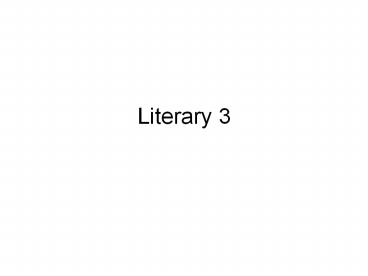Literary 3 - PowerPoint PPT Presentation
1 / 13
Title:
Literary 3
Description:
Literary 3 Grotesque: Literature that is characterized by distortions or incongruities; implies a mutation of the characters, plants and/or animals that transforms ... – PowerPoint PPT presentation
Number of Views:64
Avg rating:3.0/5.0
Title: Literary 3
1
Literary 3
2
- Grotesque Literature that is characterized by
distortions or incongruities implies a mutation
of the characters, plants and/or animals that
transforms the normal features and/or
behaviors into extremes that are meant to be
frightening and/or disturbingly comic. Also
defines a work in which two separate modes,
comedy and tragedy, are mixed. The result is a
disturbing fiction wherein comic circumstances
prelude horrific tragedy and vice versa. - The fiction of Poe is often described as being
grotesque
3
- Motif The repetition or variations of an image
or idea in a work which is used to develop theme
or characters. - Reliability A quality of some fictional
narrators whose word the reader can trust.
4
- Homily Literally means sermon, but more
informally, includes any serious talk, speech, or
lecture involving moral or spiritually advice - Hyperbole A figure of speech utilizing extreme
exaggeration or overstatement
5
- Dialect A type of informational diction.
Dialects are spoken by definable groups of people
from a particular geographic region, economic
group, or social class. Writers use dialect to
contrast and express differences in educational,
class, social, and regional backgrounds of their
characters.
6
- Aphorism A terse statement of known authorship
which expresses a general truth or moral
principle. Can be a memorable summation of the
authors point. - Analogy A similarity or comparison between two
different things or the relationship between
them. An analogy can explain something unfamiliar
by associating it with or pointing out its
similarity to something more familiar.
7
Diction Word Choice
- Formal Diction Consists of a dignified,
impersonal, and elevated use of language it
follows the rules of syntax exactly and is often
characterized by complex words and lofty tone - Middle Diction Maintains correct language usage,
but is less elevated than formal diction it
reflects the way most educated people speak
8
- Informal Diction Represents the plain language
of everyday use, and often includes idiomatic
expressions, slang, contractions, and many
simple, common words - Poetic Diction Refers to the way poets sometimes
employ an elevated diction that deviates
significantly from the common speech and writing
of their time, choosing words for their
supposedly inherent poetic qualities
9
- FORM The structure and style of a text can also
refer to genre. - ORGANIC FORM The structure of a work that has
grown naturally from the author's subject and
materials as opposed to that of a work shaped by
and conforming to artificial rules.
10
- DENOTATION the literal definition of a word
- CONNOTATION the suggesting of a meaning by a
word apart from the thing it explicitly names or
describes.
11
- SENTIMENTALITY A literary device that is used to
induce an emotional response disproportionate to
the situation, and thus to substitute heightened
and generally uncritical feeling for normal
ethical and intellectual judgment applies
feelings in inappropriate situations
12
- STOCK RESPONSE a routinely insensitive reaction
to a literary work or to some element of it. A
stock response perceives in a work only those
meanings that are already familiar from a
reader's or audience's previous experience,
failing to recognize fresh or unfamiliar
meanings.
13
- Writers may deliberately exploit stock responses
(e.g. our sympathy for the hero or heroine), but
often fall victim to them when attempting to
reach beyond readers' habitual expectations.































![[PDF⚡READ❤] Literary Life PowerPoint PPT Presentation](https://s3.amazonaws.com/images.powershow.com/10071876.th0.jpg?_=202407041211)